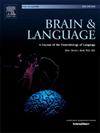Bilingual advantage for memory of events: Why now you see it, now you don’t?
IF 2.3
2区 心理学
Q1 AUDIOLOGY & SPEECH-LANGUAGE PATHOLOGY
引用次数: 0
Abstract
One of the most important findings in relation to bilingual memory has been that of shared conceptual representation and memory storage. The paper in the original volume that is being honoured here was by Jeanette Altarriba. The present contribution shares and celebrates the themes discussed in that paper, and in the spirit of the current special issue, it also highlights something new about bilingual memory that we know now and that we did not know then. The original discussions are extended by shifting the focus onto a less researched domain, namely how multiple factors of language typology, balanced vs. unbalanced proficiency and dual language activation affect bilingual memory for events. This review paper demonstrates that when it comes to the bilingual advantage for memory of witnessed events, it is very much a case of now you see it, now you don’t, and we explain the reasons behind the different outcomes.
双语对事件记忆的优势:为什么你现在看到了,现在看不到?
关于双语记忆最重要的发现之一是共享概念表征和记忆存储。在这里被授予荣誉的原始卷中的论文是Jeanette Altarriba写的。本文分享并颂扬了那篇论文中讨论的主题,本着本期特刊的精神,它还强调了一些我们现在知道而当时不知道的关于双语记忆的新东西。最初的讨论被扩展到一个研究较少的领域,即语言类型、平衡与不平衡熟练程度和双重语言激活的多重因素如何影响事件的双语记忆。这篇综述论文表明,当涉及到目击事件记忆的双语优势时,它在很大程度上是一个你现在看到了,现在你没有看到的情况,我们解释了不同结果背后的原因。
本文章由计算机程序翻译,如有差异,请以英文原文为准。
求助全文
约1分钟内获得全文
求助全文
来源期刊

Brain and Language
医学-神经科学
CiteScore
4.50
自引率
8.00%
发文量
82
审稿时长
20.5 weeks
期刊介绍:
An interdisciplinary journal, Brain and Language publishes articles that elucidate the complex relationships among language, brain, and behavior. The journal covers the large variety of modern techniques in cognitive neuroscience, including functional and structural brain imaging, electrophysiology, cellular and molecular neurobiology, genetics, lesion-based approaches, and computational modeling. All articles must relate to human language and be relevant to the understanding of its neurobiological and neurocognitive bases. Published articles in the journal are expected to have significant theoretical novelty and/or practical implications, and use perspectives and methods from psychology, linguistics, and neuroscience along with brain data and brain measures.
 求助内容:
求助内容: 应助结果提醒方式:
应助结果提醒方式:


